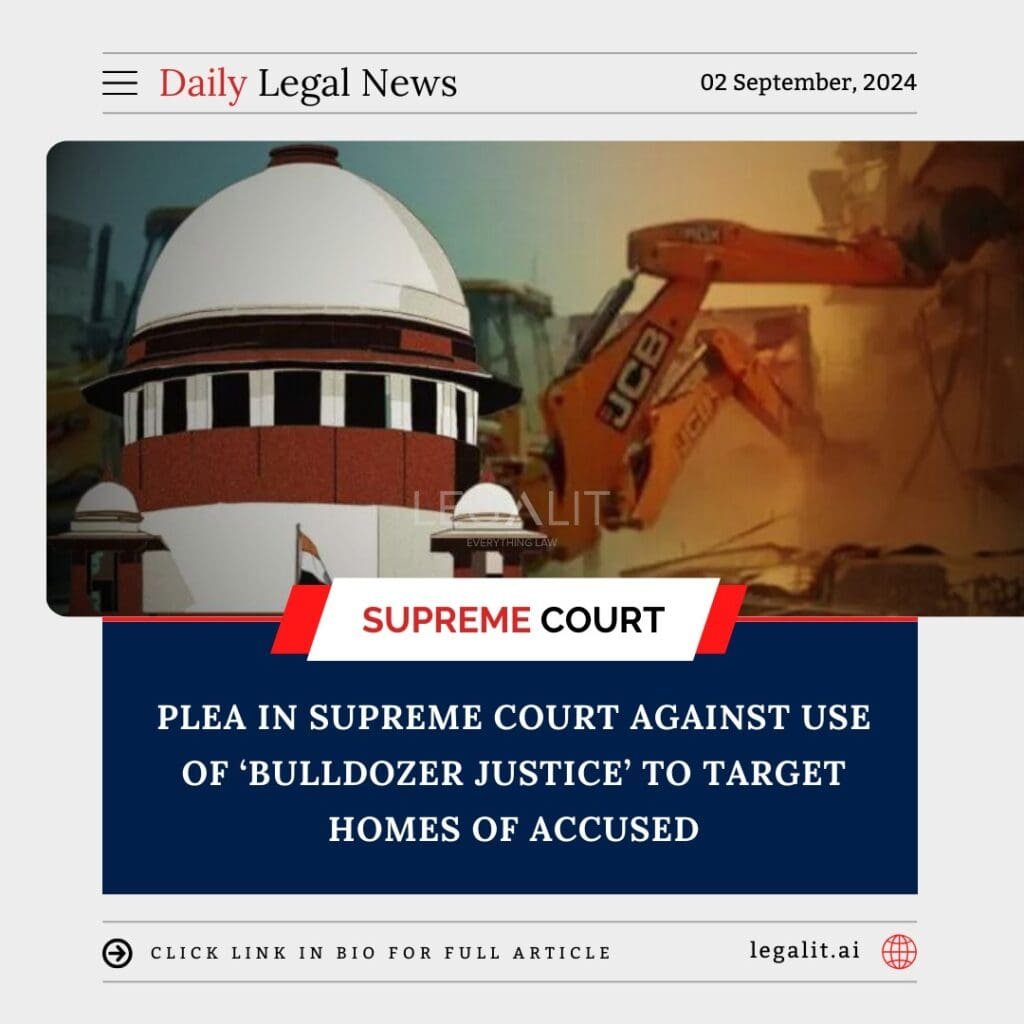
A petition has been filed in the Supreme Court of India challenging the practice known as “Bulldozer Justice,” where authorities demolish the homes of individuals accused of crimes without following due legal process. The plea argues that such actions violate constitutional rights and represent an abuse of executive power, raising serious concerns about the rule of law and due process in India.
Background of the Plea:
The term “Bulldozer Justice” refers to the controversial practice of using bulldozers to demolish properties owned by individuals accused of various crimes, particularly in cases where they are suspected of rioting, communal violence, or other offenses. This practice has been observed in several states, including Uttar Pradesh and Madhya Pradesh, where local authorities have demolished homes and shops of accused persons, often without formal charges or convictions.
Critics argue that these demolitions are carried out as a form of extrajudicial punishment, bypassing established legal procedures and violating fundamental rights guaranteed under the Indian Constitution, such as the right to equality, the right to property, and the right to a fair trial.
Key Points Raised in the Petition:
- Violation of Fundamental Rights: The petition contends that demolishing homes and properties without following due legal process infringes upon the fundamental rights of individuals, particularly the right to equality (Article 14), the right to life and personal liberty (Article 21), and the right to property (Article 300A). It argues that such actions amount to extrajudicial punishment, which is impermissible under Indian law.
- Lack of Due Process: The plea emphasizes that demolitions often occur without proper legal notice, hearings, or a chance for the accused to present their case, violating principles of natural justice. It also points out that in many instances, properties are demolished while legal proceedings are still pending, effectively bypassing the judicial process and undermining the presumption of innocence until proven guilty.
- Disproportionate Punishment: The petition argues that demolishing homes is a disproportionate response to alleged crimes and disproportionately affects marginalized and economically weaker sections of society. It further suggests that such actions can lead to social and economic devastation for families, including women, children, and the elderly, who may not be involved in the alleged crime.
- Potential for Abuse of Power: The plea raises concerns that “Bulldozer Justice” can be misused by authorities to target specific communities or individuals, particularly minorities, as a form of collective punishment or retribution. It asserts that these practices can lead to discrimination and communal tensions, further polarizing society.
- Urgent Need for Judicial Intervention: The petition calls on the Supreme Court to intervene and issue guidelines or directions to prevent the misuse of administrative power by local authorities. It seeks the court’s direction to ensure that any demolition action is carried out strictly in accordance with legal procedures, with adequate safeguards to protect fundamental rights.
Supreme Court’s Consideration:
The Supreme Court has taken cognizance of the plea and is expected to hear arguments from both sides in the coming weeks. The court may seek responses from the central and state governments to explain their positions on the issue and the legal basis for demolitions carried out without due process.
The Court may also examine whether existing laws and regulations provide sufficient safeguards against arbitrary or discriminatory demolitions and if there is a need for clearer judicial guidelines to prevent abuse of power by local authorities.
Broader Implications:
This plea has significant implications for the rule of law and governance in India. If the Supreme Court rules in favor of the petitioners, it could establish new legal standards for the use of executive power in property demolitions and reinforce the importance of due process and fundamental rights. A favorable ruling could also provide greater protection to marginalized communities often disproportionately affected by such actions.
On the other hand, the government may argue that demolitions are necessary to maintain law and order and deter criminal activities. The case will test the balance between maintaining public order and safeguarding individual rights, and the outcome could shape India’s legal landscape regarding executive authority and property rights.
As the Supreme Court prepares to hear this plea, it will be closely monitored by legal experts, human rights advocates, and civil society organizations, as it could set a crucial precedent for the protection of constitutional rights in India.